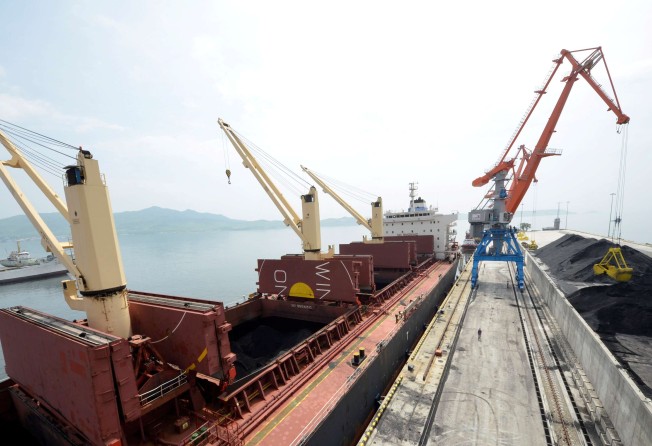North Korea ‘feels the heat’ from China’s renewed coal bans
Signs of a growing divide between communist neighbours as Beijing tightens sanctions against Pyongyang, analysts say

Pyongyang’s broadside against Beijing over China’s decision last week to suspend imports of North Korean coal this year has yet again laid bare a growing division between the two communist allies.
State-controlled Korean Central News Agency, which has largely kept quiet over the past week, finally broke the embarrassing silence and slammed Beijing for colluding with “hostile forces in conspiracies to bring down” the North Korean regime.
Such outbursts, according to diplomatic observers, are an unmistakable sign that the heat has been felt in Pyongyang.
Beijing’s belated move to tighten international sanctions on the unruly North Korean leader Kim Jong-un followed a United Nations resolution in November.
Although it was not the first time Beijing had taken steps to punish Pyongyang by cutting imports of coal, the country’s single biggest export and source of hard currency, it was widely seen as one of the toughest by far, signalling Beijing’s growing unease with its neighbour’s nuclear weapons programme.
The last time China banned North Korean coal imports was in April last year, a month after UN Resolution 2270 was passed in response to Pyongyang’s fourth nuclear test and satellite launch.
But that resolution contained an exception clause, allowing trade in North Korean coal for “livelihood purposes”.
Thanks to the loophole, Beijing made exceptions for North Korean coal intended for household use, a move widely criticised by the United States and its allies as undermining the effectiveness of the resolution.
Coal is estimated to take up as much as 40 per cent of North Korea’s exports to China, Pyongyang’s biggest trading partner.
Last year, North Korea was China’s biggest supplier of high-grade anthracite coal, used mainly by the country’s steel mills, with imports reaching 22.4 million tonnes, up 14.5 per cent compared with 2015.
The United Nations sought to plug this gap when it adopted Resolution 2321 on November 30 in the wake of a fifth nuclear test in September. This resolution set caps on North Korea’s coal exports by both volume and value.
Despite the tough resolution, China’s coal imports from North Korea surged in December, according to date from Chinese customs. China imported 2 million tonnes worth US$168 million in December, exceeding the UN Security Council’s monthly limit by at least one million tonnes and nearly US$115 million.
According to the most recent data, China imported 1.45 million tonnes from North Korea in January, accounting for almost 20 per cent of the annual UN quota of 7.5 million tonnes or US$400.9 million, whichever is smaller.
On Friday, Chinese foreign ministry spokesman Geng Shuang vowed again that China would fully enforce UN Security Council resolutions, but nonetheless admitted that China has already approached the upper limits of coal imports from North Korea. “So because of this, we have stopped imports of coal from North Korea with a responsible attitude.”
Beijing has repeatedly denied a link but many analysts have pointed out that China’s latest ban on North Korea coal imports came soon after Pyongyang’s first missile test this year and the assassination of Kim’s elder brother, Kim Jong-nam.
Professor Lee Jung-nam, a China affairs expert at Korea University’s Asiatic Research Institute, said South Korean analysts generally believed Beijing was irritated by Kim Jong-nam’s death, seeing it as another blow to relations between the communist allies.
Other analysts said the timing of Beijing’s action against Pyongyang was also linked to Beijing’s eagerness for closer ties with US President Donald Trump. “Apparently, North Korea plays an increasingly important role in Beijing’s ties with Washington as both sides seek to find new areas of common interest and cooperation,” said Cui Zhiying, a Korean affairs analyst at Shanghai’s Tongji University.
But most observers cautioned that Beijing was unlikely to take further action to punish Pyongyang, such as banning oil supplies, for fear that the North Korean regime could be devastated.
Additional reporting by Reuters